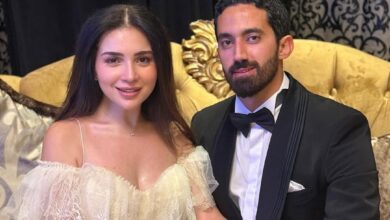Dar al-Shorouk recently published "Al-Kitab Al-Thany" (The Second Book) by writer and radio and TV host Ahmed al-Esseily. Offering reflections on life, religion, love and many other personal topics, “The Second Book” – coming after his 2009 debut “A Book Without a Name” – is not a self-improvement book. Yet while it will not tell you what to do or how to think, it may open your eyes to things that have been sitting directly under your nose for years without you even noticing.
For those looking for an easy read, this is not the book for you, as the author pours out a trove of months or even years of contemplations about life and people. The result is rewarding, though, as Esseily’s unique writing style mixes colloquial with formal Arabic, engaging the mind and pleasing the ear.
Esseily writes exactly how he talks, making his prose familiar and pleasant. Fans of his TV show, “Esseily fel Sharaa” (Esseily in the Street), in which he interviews random people on a large red couch set-up in the street throughout Ramadan to talk about whatever crosses their minds, would definitely enjoy the book.
Esseily uses terminology that catches your attention and inspires you to ask further questions. His use of macho words, coupled with his light sense of humor, makes for a successful combination. For example, he writes in the chapter “The Talk of the Talk”:
Everything I think is right, is a right that might be wrong; and everything I think is wrong, is a wrong that might be right.
“The Second Book” touches upon multiple cultural taboos, such as religion. Esseily argues that people’s understanding of religion may have become too literal and that perhaps the following of rituals has taken precedence over spirituality.
He also discusses sexual harassment and indirectly links it to misinterpretations of religious teachings on the veil. He argues that though people of Egypt have always been religious, in the past, the way a woman dressed was never linked to her conduct or behavior. What has changed in the past few decades, he says, is the way men look at women; women have come to be seen as sexual objects, a behavior which he attributes to ignorance and a lack of culture, decency and class, as well as rising intolerance.
“This has nothing to do with sexual frustration,” he writes. In the sixties and seventies, people had financial problems that delayed their marriage plans but they were gallant, civilized and had more respect for women, he contends. “Most harassers are young men and adolescents; and their behavior is the consequence of their faulty upbringing.”
Esseily also discusses love and marriage, comparing life to a big fire. “Let the fire cool off and then start thinking,” he advises his readers. “Take your time and study your partner; marriage is like a dark hole but you will never know what is down there until you jump!”
Anticipating how his readers might react, Esseily makes sure to cover all sides of his arguments. This causes some chapters to drag on a bit, but in most cases his justifications are worth the trouble.
As a reader, you often find yourself thinking of Esseily as a brother, a parent, a friend or a good acquaintance. He does not preach or look down on his readers; on the contrary, you feel that he wants to take each reader on a journey of questioning and discovery.
“The Second Book” is an informative and interactive read that is highly recommended, a pleasant surprise and about-face from his previous “A Book Without a Name," which was less deep and lacked precision and a smooth flow of ideas.




